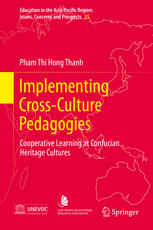

Most ebook files are in PDF format, so you can easily read them using various software such as Foxit Reader or directly on the Google Chrome browser.
Some ebook files are released by publishers in other formats such as .awz, .mobi, .epub, .fb2, etc. You may need to install specific software to read these formats on mobile/PC, such as Calibre.
Please read the tutorial at this link: https://ebookbell.com/faq
We offer FREE conversion to the popular formats you request; however, this may take some time. Therefore, right after payment, please email us, and we will try to provide the service as quickly as possible.
For some exceptional file formats or broken links (if any), please refrain from opening any disputes. Instead, email us first, and we will try to assist within a maximum of 6 hours.
EbookBell Team

5.0
100 reviewsDuring the last two decades Confucian heritage culture countries have widely promoted teaching and learning reforms to advance their educational systems. To skip the painfully long research stage, Confucian heritage culture educators have borrowed Western philosophies and practices with the assumption that what has been done successfully in the West will produce similar outcomes in the East. The wide importation of cooperative learning practices to Confucian heritage culture classrooms recently is an example. However, cooperative learning has been documented in many studies not to work effectively in Confucian heritage culture classrooms. The reason is that the educators often impose this instructional method on the students without a careful consideration of its appropriateness in the socio-cultural context of Confucian heritage culture countries. This procedure is not effective and professional because learning does not stand alone. Rather, it is shaped and influenced by other factors including teaching methods, learning tasks, assessment demands, workload and the learning culture of students in the local context. For cooperative learning to work effectively in Confucian heritage culture classrooms, reformers need to consider the importation of this approach in line with a careful examination of all supports and constraints that affect those factors that are associated with learning.
The volume provides an applied theoretical framework and culturally appropriate and practical instructions that could assist Confucian heritage culture educators and teachers to address various factors at multiple levels in order to optimize success in importing cooperative learning to their classrooms. Overall, it provides strategies to assist Confucian heritage culture teachers to change their teaching practices, redesign lessons plans, design assessment methods, and organize learning activities in a manner that can influence Confucian heritage culture students to shift from employing teacher-centered learning approaches to cooperative learning.